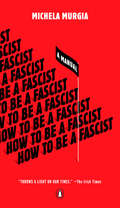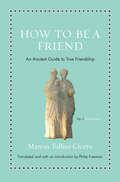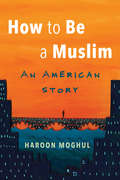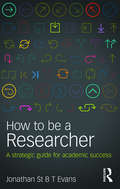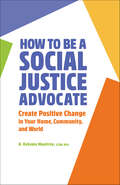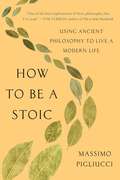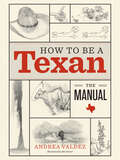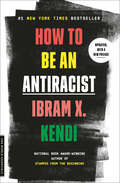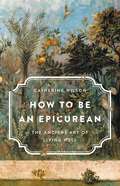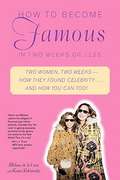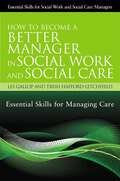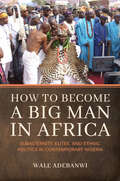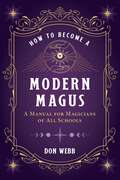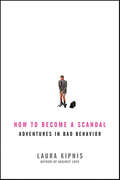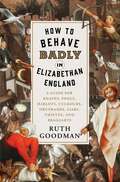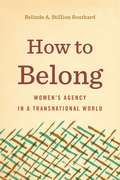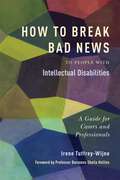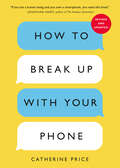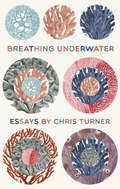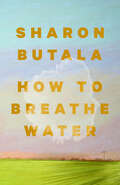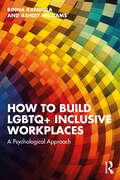- Table View
- List View
How to Be a Fascist: A Manual
by Michela MurgiaThe first and only guide to turning your 21st century democracy into a fascist paradise.Democracy is difficult, flawed and unstable. It involves barely distinguishable political parties taking part in lengthy, overcomplicated and expensive decision-making processes. Trying to engage so many people with political issues seems to lead only to complexity and disagreement. So why bother? Doesn't fascism guarantee a more effective and efficient management of the state?In this short, bitingly ironic mixture of On Tyranny and The Psychopath Test, Italian political activist Michela Murgia explores the logic that is attracting increasing numbers of voters to right-wing populism. Far from its origins in the 20th century, fascism is once again on the rise in an age of increased connectivity and globalism. Murgia shows how many of the elements of our society that we might think would combat closed-mindedness and xenophobia actually fan the flames. Closing with a "fascistometer" to measure the reader's own authoritarian inclinations, How to be a Fascist is a refreshingly direct, polemical book that asks us to confront the fascisim in our governments, in our societies, and in our own political leanings.
How to Be a Friend: An Ancient Guide to True Friendship (Ancient Wisdom for Modern Readers)
by Marcus Tullius Cicero Philip FreemanA splendid new translation of one of the greatest books on friendship ever writtenIn a world where social media, online relationships, and relentless self-absorption threaten the very idea of deep and lasting friendships, the search for true friends is more important than ever. In this short book, which is one of the greatest ever written on the subject, the famous Roman politician and philosopher Cicero offers a compelling guide to finding, keeping, and appreciating friends. With wit and wisdom, Cicero shows us not only how to build friendships but also why they must be a key part of our lives. For, as Cicero says, life without friends is not worth living.Filled with timeless advice and insights, Cicero’s heartfelt and moving classic—written in 44 BC and originally titled De Amicitia—has inspired readers for more than two thousand years, from St. Augustine and Dante to Thomas Jefferson and John Adams. Presented here in a lively new translation with the original Latin on facing pages and an inviting introduction, How to Be a Friend explores how to choose the right friends, how to avoid the pitfalls of friendship, and how to live with friends in good times and bad. Cicero also praises what he sees as the deepest kind of friendship—one in which two people find in each other “another self” or a kindred soul.An honest and eloquent guide to finding and treasuring true friends, How to Be a Friend speaks as powerfully today as when it was first written.
How to Be a Good Girl: A Miscellany
by Jamie HoodThe ambitious and experimental debut by Jamie Hood, author of Trauma Plot, interrogating the &“good girl&” archetype and the price one pays to embody itIn the thick of winter 2020, when so many books were buried beneath the catastrophe of the COVID-19 news cycle, one unlikely debut seemed to cut through the noise. Jamie Hood&’s How to Be a Good Girl was an inventive and hybrid work of self-making, mingling diary entries, poetry, literary criticism, and love letters to interrogate the archetype of the &“good girl,&” and the ideas of femininity, passivity, desire, and trauma that come with it. Journeying from the ice age to our modern-day climate crisis, it devoured texts as expansive as Levinas and Plath to the Ronettes and after-school specials, all the while asking: what pound of flesh must a woman pay to be seen as &“good.&”How to Be a Good Girl was a critical darling when it was first published by Grieveland. The Rumpus praised its &“bold vulnerability,&” and Vogue named it a Best Book of 2020. Now, Vintage is proud to reissue this provocative and genre-bending debut and find new readers for an exciting, new literary voice.
How to Be a Muslim: An American Story
by Haroon MoghulA young Muslim leader’s memoir of his struggles to forge an American Muslim identityHaroon Moghul was thrust into the spotlight after 9/11, becoming an undergraduate leader at New York University’s Islamic Center forced into appearances everywhere: on TV, before interfaith audiences, in print. Moghul was becoming a prominent voice for American Muslims even as he struggled with his relationship to Islam. In high school he was barely a believer and entirely convinced he was going to hell. He sometimes drank. He didn’t pray regularly. All he wanted was a girlfriend.But as he discovered, it wasn’t so easy to leave religion behind. To be true to himself, he needed to forge a unique American Muslim identity that reflected his beliefs and personality. How to Be a Muslim reveals a young man coping with the crushing pressure of a world that fears Muslims, struggling with his faith and searching for intellectual forebears, and suffering the onset of bipolar disorder. This is the story of the second-generation immigrant, of what it’s like to lose yourself between cultures and how to pick up the pieces.
How to Be a Researcher: A strategic guide for academic success
by Jonathan St EvansHow to be a Researcher provides a strategic guide to the conduct of a successful research career within a university environment. Based on the author’s extensive personal experience, it offers down-to-earth advice, philosophical guidance, and discussions of the political context of academic research. This is not a research methods book, and the topics it covers are rarely discussed elsewhere. The bulk of the book provides practical advice on the development of essential skills and strategic approaches, covering questions such as: how to decide which topics to work on how to read and review literature how to develop theory how to integrate research and teaching activity how to approach research design how to obtain and manage research funding how to collaborate and supervise effectively how to write up your research, and how to secure the best sources of publication. The final part of the book considers the philosophy and psychology of research work and includes an exploration of the cognitive biases which may affect researchers. How to be a Researcher will be particularly useful for masters and doctoral students in the behavioral and social sciences, and also for early career academics developing research within a university career.
How to Be a Social Justice Advocate: Create Positive Change in Your Home, Community, and World
by A. Rahema MooltreyTake action to promote social justice with help from this practical guideSocial justice is about uplifting and empowering underserved and marginalized communities impacted by systems of oppression. While believing in equity and fairness is easy, taking action and doing your part requires work. This book is filled with practical, real-world advice that shows you how to serve and support your community through activism. You'll discover concrete steps you can take in 4 key areas that determine well-being and livelihood for all groups of people: education, economic stability, health, and safety.This standout among social justice books encourages you to:Get involved—Examine your intentions and unconscious biases, take stock of your strengths and interests, and consider important historical contexts when involving yourself in social justice work.See justice in action—Read relatable stories about real-life social justice wins to help inspire your own activism.Engage with others—Social justice is only possible when in community with others. Find tips on involving friends, family, and other community members in respectful and sustainable ways.Promote social justice and help create meaningful change with How to Be a Social Justice Advocate.
How to Be a Stoic: Using Ancient Philosophy to Live a Modern Life
by Massimo PigliucciAn engaging guide to how Stoicism--the ancient philosophy of Epictetus and Marcus Aurelius--can provide lessons for living in the modern worldWhenever we worry about what to eat, how to love, or simply how to be happy, we are worrying about how to lead a good life. No goal is more elusive. In How to Be a Stoic, philosopher Massimo Pigliucci offers Stoicism, the ancient philosophy that inspired the great emperor Marcus Aurelius, as the best way to attain it. Stoicism is a pragmatic philosophy that teaches us to act depending on what is within our control and separate things worth getting upset about from those that are not. By understanding Stoicism, we can learn to answer crucial questions: Should we get married or divorced? How should we bank in a world nearly destroyed by a financial crisis? How can we survive great personal tragedy? Whoever you are, Stoicism has something for you-and How to Be a Stoic is your essential guide.
How to Be a Texan: The Manual
by Andrea ValdezThere are certain things every Texan should know how to do and say, whether your Lone Star roots reach all the way back to the 1836 Republic or you were just transplanted here yesterday. Some of these may be second nature to you, but others . . . well, maybe it wouldn’t hurt to have a few handy hints if, say, branding the herd or hosting a tamalada aren’t your usual pastimes. That’s where How to Be a Texan can help. In a friendly, lighthearted style, Andrea Valdez offers illustrated, easy-to-follow steps for dozens of authentic Texas activities and sayings. In no time, you’ll be talking like a Texan and dressing the part; hunting, fishing, and ranching; cooking your favorite Texas dishes; and dancing cumbia and two-step. You’ll learn how to take a proper bluebonnet photo and build a Día de los Muertos altar, and you’ll have a bucket list of all the places Texans should visit in their lifetime. Not only will you know how to do all these things, you’ll finish the book with a whole new appreciation for what it means to be a Texan and even more pride in saying “I’m from Texas” anywhere you wander in the world.
How to Be an Anticapitalist in the Twenty-First Century
by Erik Olin WrightWhat is wrong with capitalism, and how can we change it?Capitalism has transformed the world and increased our productivity, but at the cost of enormous human suffering. Our shared values—equality and fairness, democracy and freedom, community and solidarity—can provide both the basis for a critique of capitalism and help to guide us toward a socialist and democratic society. Erik Olin Wright has distilled decades of work into this concise and tightly argued manifesto: analyzing the varieties of anticapitalism, assessing different strategic approaches, and laying the foundations for a society dedicated to human flourishing. How to Be an Anticapitalist in the Twenty-First Century is an urgent and powerful argument for socialism, and an unparalleled guide to help us get there. Another world is possible. Included is an afterword by the author’s close friend and collaborator Michael Burawoy.
How to Be an Antiracist (One World Essentials)
by Ibram X. Kendi#1 NEW YORK TIMES BESTSELLER • From the National Book Award–winning author of Stamped from the Beginning comes a &“groundbreaking&” (Time) approach to understanding and uprooting racism and inequality in our society and in ourselves—now updated, with a new preface.&“The most courageous book to date on the problem of race in the Western mind.&”—The New York Times ONE OF THE BEST BOOKS OF THE YEAR—The New York Times Book Review, Time, NPR, The Washington Post, Shelf Awareness, Library Journal, Publishers Weekly, Kirkus ReviewsAntiracism is a transformative concept that reorients and reenergizes the conversation about racism—and, even more fundamentally, points us toward liberating new ways of thinking about ourselves and each other. At its core, racism is a powerful system that creates false hierarchies of human value; its warped logic extends beyond race, from the way we regard people of different ethnicities or skin colors to the way we treat people of different sexes, gender identities, and body types. Racism intersects with class and culture and geography and even changes the way we see and value ourselves. In How to Be an Antiracist, Kendi takes readers through a widening circle of antiracist ideas—from the most basic concepts to visionary possibilities—that will help readers see all forms of racism clearly, understand their poisonous consequences, and work to oppose them in our systems and in ourselves.Kendi weaves an electrifying combination of ethics, history, law, and science with his own personal story of awakening to antiracism. This is an essential work for anyone who wants to go beyond the awareness of racism to the next step: contributing to the formation of a just and equitable society.
How to Be an Epicurean: The Ancient Art of Living Well
by Catherine WilsonA leading philosopher shows that if the pursuit of happiness is the question, Epicureanism is the answer Epicureanism has a reputation problem, bringing to mind gluttons with gout or an admonition to eat, drink, and be merry. In How to Be an Epicurean, philosopher Catherine Wilson shows that Epicureanism isn't an excuse for having a good time: it's a means to live a good life. Although modern conveniences and scientific progress have significantly improved our quality of life, many of the problems faced by ancient Greeks -- love, money, family, politics -- remain with us in new forms. To overcome these obstacles, the Epicureans adopted a philosophy that promoted reason, respect for the natural world, and reverence for our fellow humans. By applying this ancient wisdom to a range of modern problems, from self-care routines and romantic entanglements to issues of public policy and social justice, Wilson shows us how we can all fill our lives with purpose and pleasure.
How to Be an Inclusive Leader: Your Role in Creating Cultures of Belonging Where Everyone Can Thrive
by Jennifer BrownWe know why diversity is important, but how do we drive real change at work? Diversity and inclusion expert Jennifer Brown provides a step-by-step guide for the personal and emotional journey we must undertake to create an inclusive workplace where everyone can thrive. Human potential is unleashed when we feel like we belong. That's why inclusive workplaces experience higher engagement, performance, and profits. But the reality is that many people still feel unable to bring their true selves to work. In a world where the talent pool is becoming increasingly diverse, it's more important than ever for leaders to truly understand how to support inclusion.Drawing on years of work with many leading organizations, Jennifer Brown shows what leaders at any level can do to spark real change. She guides readers through the Inclusive Leader Continuum, a set of four developmental stages: unaware, aware, active, and advocate. Brown describes the hallmarks of each stage, the behaviors and mind-sets that inform it, and what readers can do to keep progressing. Whether you're a powerful CEO or a new employee without direct reports, there are actions you can take that can drastically change the day-to-day reality for your colleagues and the trajectory of your organization.Anyone can—and should—be an inclusive leader. Brown lays out simple steps to help you understand your role, boost your self-awareness, take action, and become a better version of yourself in the process. This book will meet you where you are and provide a road map to create a workplace of greater mutual understanding where everyone's talents can shine.
How to Become Famous in Two Weeks or Less
by Melissa de la Cruz Karen Robinovitz2 WOMEN, 14 DAYS. THE GOAL? ACHIEVE BOLD FACE STATUS SIGHTINGS: Spotted last night at a giant bash at Nobu: fashionista cuties Karen Robinovitz and Melissa De La Cruz. Karen was heard saying she’s “still exhausted” from her recent Bungalow 8 birthday party that would have made P. Diddy jealous. Apparently, she was wearing two million dollars’ worth of Harry Winston diamonds (including the 22-carat ring Whoopie Goldberg wore to the Oscars) and was constantly shadowed by a bodyguard named Lou who was straight out of a Scorsese film. Melissa, also fatigued from the fast track, just hosted an intimate dinner party at a swanky Upper East Side restaurant attended by trend-setting journos from New York magazine, The Observer, Allure, “Page Six” as well as the indefatigable Michael Musto–and as part of the gift bag giveaway, the whole crew is being flown to Miami to stay at a five-star resort favored by the likes of Will Smith. Asked how they managed to go from barely-known freelance writers to A-list celebrities in just fourteen days, they coyly spilled the beans: Marie Claire called with the assignment, and they simply begged, clawed, cried, borrowed, cheated, lied, stole, and bribed their way to fame. Their how-to tips to stardom include “Pick an M&M color to hate, and stick to it. ” And they’re writing a book, daaahlings, so whether you live in New York or Nebraska, you too can have the goods to claim your own fame and become legendary. From the Trade Paperback edition.
How to Become a Better Manager in Social Work and Social Care: Essential Skills for Managing Care
by Trish Hafford-Letchfield Les GallopSocial work and social care managers often find themselves in management positions without having had any formal management training, yet skills and knowledge specific to social care settings are essential for effective practice. This book offers a researched and practical guide to the fundamental skills and knowledge that a manager needs, underpinned by the values and ethics that are inherent to social work and social care. Core skills covered include time management, recruitment, managing meetings, working in partnership with service users, negotiation and conflict management, and mentoring and coaching. A self-improvement feedback assessment is included, and the book features learning activities, practical tools, case examples, summaries and action checklists. This must-have handbook will help social work and social care managers and students to understand and accomplish the core skills needed for excellent management practice.
How to Become a Big Man in Africa: Subalternity, Elites, and Ethnic Politics in Contemporary Nigeria
by Wale AdebanwiCan subalterns transform themselves into members of the elite, and what does it take to do so? And how do those efforts reveal the nature of ethnic politics in postcolonial Africa? How to Become a Big Man in Africa: Subalternity, Elites, and Ethnic Politics in Contemporary Nigeria examines these questions by revealing how, through ethno-regional conflict, violence and cultural activities, an artisan, Gani Adams, transformed himself into the holder of the most prestigious chieftaincy title among the Yoruba. Addressing persistent gaps in anthropological studies of the subaltern and of "big men" in politics through in-depth biography and rich social history, Wale Adebanwi follows Adams and other major figures in Nigeria's Oodua People's Congress (OPC) over two decades of ethnographic study and visual representations. Challenging existing models of African political mobility by leveraging his initial lack of formal education into a position of power, Adams moved from a "radical lumpen" and "area boy" to a "big man" who continues to struggle—and reflect—over the significance of his role as a cultural subject. Blurring the lines between tradition and modernity, Adams and his group have used Yoruba rituals to simultaneously claim authenticity and champion new movements for democracy and self-determination.How to Become a Big Man in Africa encourages us to understand the full complexity of Adams's political trajectory and how it reflects the structural and personal realities of becoming a "Big Man" in the contemporary postcolony.
How to Become a Modern Magus: A Manual for Magicians of All Schools
by Don WebbA detailed step-by-step program for building a magical practice• Offers a full 12 months of activities, rituals, spells, and exercises to help you acquire magical skills and knowledge and achieve your goals• Details the practice of Egyptian Soul Craft, including how to work with the KA and the BA and how to perform magical workings with Egyptian deities• Shares spells for specific purposes, from manifesting wealth to summoning lost things to healing ailments, as well as providing templates to create your own rituals and custom spellsIn this practical training guide, Don Webb lays out a detailed step-by-step program for building and sustaining a magical practice. Based not on Eliphas Levi&’s correspondence system but on an older form of Egyptian magic, as well as drawing on Chaos Magic, shamanism, and the secret techniques of the Temple of Set, the program offers a full 12 months of activities, rituals, spells, and exercises to help you acquire magical skills and knowledge and maximize your strengths over the course of a year. Beginning with the hows and whys of magic, as well as the real dangers of the occult and how to avoid or cure them, the author shares experiences from his 45 years of personal work and 30 years of teaching the magical arts. He presents the Inshallo Rite for creating a magical helper as the first step on the road to becoming a magician. Presenting a chapter-per-month curriculum, he explores the magical powers of elements, gods, and esoteric traditions, with weekly and daily exercises as well as emotional and mental training connected to each month&’s topic. He examines the four elements in depth, sharing rites, invocations, spells, and activities for working magically with each element. Based on more than three decades of magical teaching, Don Webb&’s guide to becoming a modern magus will help beginners start their magical journey and support experienced magicians to revitalize and balance their existing practice.
How to Become a Scandal: Adventures in Bad Behavior
by Laura KipnisWe all relish a good scandal—the larger the figure (governor, judge) and more shocking the particulars (diapers, cigars)—the better. But why do people feel compelled to act out their tangled psychodramas on the national stage, and why do we so enjoy watching them, hurling our condemnations while savoring every lurid detail? With "pointed daggers of prose" (The New Yorker), Laura Kipnis examines contemporary downfall sagas to lay bare the American psyche: what we desire, what we punish, and what we disavow. She delivers virtuoso analyses of four paradigmatic cases: a lovelorn astronaut, an unhinged judge, a venomous whistleblower, and an over-imaginative memoirist. The motifs are classic—revenge, betrayal, ambition, madness—though the pitfalls are ones we all negotiate daily. After all, every one of us is a potential scandal in the making: failed self-knowledge and colossal self-deception—the necessary ingredients—are our collective plight. In How to Become a Scandal, bad behavior is the entry point for a brilliant cultural romp as well as an anti-civics lesson. "Shove your rules," says scandal, and no doubt every upright citizen, deep within, cheers the transgression—as long as it's someone else's head on the block.
How to Behave Badly in Elizabethan England: A Guide For Knaves, Fools, Harlots, Cuckolds, Drunkards, Liars, Thieves, And Braggarts
by Ruth GoodmanOffensive language, insolent behavior, slights, brawls, and scandals come alive in Ruth Goodman’s uproarious history. Every age and social strata has its bad eggs, rule-breakers, and nose-thumbers. As acclaimed popular historian and author of How to Be a Victorian Ruth Goodman shows in her madcap chronicle, Elizabethan England was particularly rank with troublemakers, from snooty needlers who took aim with a cutting “thee,” to lowbrow drunkards with revolting table manners. Goodman draws on advice manuals, court cases, and sermons to offer this colorfully crude portrait of offenses most foul. Mischievous readers will delight in learning how to time your impressions for the biggest laugh, why quoting Shakespeare was poor form, and why curses hurled at women were almost always about sex (and why we shouldn’t be surprised). Bringing her signature “exhilarating and contagious” enthusiasm (Boston Globe), this is a celebration of one of history’s naughtiest periods, when derision was an art form.
How to Belong: Women’s Agency in a Transnational World (Rhetoric and Democratic Deliberation #18)
by Belinda A. Stillion SouthardIn How to Belong, Belinda Stillion Southard examines how women leaders throughout the world have asserted their rhetorical agency in troubling economic, social, and political conditions. Rather than utilizing the concept of citizenship to bolster political influence, the women in the case studies presented here rely on the power of relationships to create a more habitable world.With the rise of global capitalism, many nation-states that have profited from invigorated flows of capital have also responded to the threat of increased human mobility by heightening national citizenship’s exclusionary power. Through a series of case studies that include women grassroots protesters, a woman president, and a woman United Nations director, Stillion Southard analyzes several examples of women, all as embodied subjects in a particular transnational context, pushing back against this often violent rise in nationalist rhetoric. While scholars have typically used the concept of citizenship to explain what it means to belong, Stillion Southard instead shows how these women have reimagined belonging in ways that have enabled them to create national, regional, and global communities.As part of a broader conversation centered on exposing the violence of national citizenship and proposing ways of rejecting that violence, this book seeks to provide answers through the powerful rhetorical practices of resilient and inspiring women who have successfully negotiated what it means to belong, to be included, and to enact change beyond the boundaries of citizenship.
How to Belong: Women’s Agency in a Transnational World (Rhetoric and Democratic Deliberation #18)
by Belinda A. Stillion SouthardIn How to Belong, Belinda Stillion Southard examines how women leaders throughout the world have asserted their rhetorical agency in troubling economic, social, and political conditions. Rather than utilizing the concept of citizenship to bolster political influence, the women in the case studies presented here rely on the power of relationships to create a more habitable world.With the rise of global capitalism, many nation-states that have profited from invigorated flows of capital have also responded to the threat of increased human mobility by heightening national citizenship’s exclusionary power. Through a series of case studies that include women grassroots protesters, a woman president, and a woman United Nations director, Stillion Southard analyzes several examples of women, all as embodied subjects in a particular transnational context, pushing back against this often violent rise in nationalist rhetoric. While scholars have typically used the concept of citizenship to explain what it means to belong, Stillion Southard instead shows how these women have reimagined belonging in ways that have enabled them to create national, regional, and global communities.As part of a broader conversation centered on exposing the violence of national citizenship and proposing ways of rejecting that violence, this book seeks to provide answers through the powerful rhetorical practices of resilient and inspiring women who have successfully negotiated what it means to belong, to be included, and to enact change beyond the boundaries of citizenship.
How to Break Bad News to People with Intellectual Disabilities: A Guide for Carers and Professionals
by Irene Tuffrey-Wijne Sheila HollinsThis book offers unique and flexible guidelines that can be used by practitioners to ease the process of breaking bad news to people with intellectual disabilities. The guidelines, which are adaptable to individual communication ability and level of understanding, address the many complex needs of people with intellectual disabilities who can find understanding and accepting news that has a negative impact on their life a very difficult task. In the book, Irene Tuffrey-Wijne covers a range of different types of bad news, from bereavement and illness to more minor issues such as a change of accommodation, and offers highly practical and effective tips that will help carers and practitioners ensure that bad news is relayed as sensitively and successfully as possible. An easy-to-use and comprehensive guide, this book will be an invaluable resource of information for carers, health professionals such as doctors and nurses as well as families of people with intellectual disabilities.
How to Break Up with Your Phone, Revised Edition: The 30-Day Digital Detox Plan
by Catherine PriceThis evidence-based, user-friendly guide presents a 30-day digital detox plan that will help you set boundaries with your phone and live a more joyful and fulfilling life.&“I wrote The Anxious Generation to help adults improve the lives of children. Many readers have asked me for a version of the book aimed at helping adults and teens help themselves. Catherine Price has written the best such book.&”—Jonathan Haidt Do you feel addicted to your phone? Do you frequently pick it up &“just to check,&” only to look up forty-five minutes later wondering where the time has gone? Does social media make you anxious? Have you tried to spend less time mindlessly scrolling—and failed? If so, this book is your solution. Award-winning health and science journalist and TED speaker Catherine Price presents a practical, evidence-based 30-day digital detox plan that will help you break up—and then make up—with your phone. The goal: better mental health, improved screen-life balance, and a long-term relationship with technology that feels good.This engaging, user-friendly guide explains how our smartphones and apps are designed to be addictive and how the time we spend on them is increasing our anxiety and damaging our abilities to focus, think deeply, form new memories, generate ideas, and be present in our most important relationships. Next, it walks you through an effective and easy-to-follow 30-day plan that has already helped thousands of people worldwide break their phone addictions and feel more fully alive. Whether you need help for yourself or for your family, friends, students, colleagues, clients, or community, How to Break Up with Your Phone is the ultimate guide to digital detoxing. It&’s guaranteed to help you put down your phone—and come back to life.
How to Breathe Underwater
by Chris TurnerThe essays and reportage in How to Breathe Underwater offer a panoramic overview of this age of radical change-from the online gambling boom in the Caribbean to Cyberjaya, the Malaysian government's attempt to build its own Silicon Valley; from video game design to digital-age tabloid journalism to the artistry of The Simpsons; and from the fate of the Great Barrier Reef to Cuba's economic limbo after the fall of the Soviet empire. In field reports that survey the rise of the internet in the 1990s, analyze the changing nature of mass culture in the digital age, and provide a multifaceted look at how human industry is shaping the planet's foundations, this collection presents a fractal portrait of a society in rapid flux. Chris Turner is the author of four previous books, a nine-time National Magazine Award winner and a sought-after speaker on the rise of the global green economy, as well as a celebrated feature writer for The Walrus, Canadian Geographic, The Globe & Mail and other major publications. His lively and passionate reportage, along with his incisive essays and shrewd cultural criticism, have for the past fifteen years made essential contributions to the debates on our climate, culture, and technology. They are collected here for the first time.Praise for How To Breathe Underwater"Chris Turner is among the best magazine writers on the planet. His writing is so beautiful, wry and well-reported that it's spellbinding. And spellbreaking: He wakes you up, makes you sit upright and look afresh at our culture, our climate, and where we need to go. This is literary nonfiction at its finest."-Clive Thompson, Wired columnist and author of Smarter Than You Think"Chris Turner is the master of long-form journalism in Canada, a smart, funny, and endlessly curious envoy to everywhere. This collection gathers his best work, forging links of meaning in a chain of superb reporting and writing; readers will see many choice pieces and realize, maybe for the first time, that they were all fashioned by the same indefatigable intelligence."-Mark Kingwell, the author of A Civil Tongue"Whatever you choose to call this kind of stylishly reported, deeply engaged, richly nuanced, gorgeously written nonfiction--saturation reportage, new journalism, longform writing--it without question qualifies as real literature. It's the only kind of journalism that gets remembered, and the only kind that produces real change. Chris Turner has been writing it since he started taking notes."-Ian Brown, author of The Boy in the Moon and Globe & Mail feature writer
How to Breathe Water
by Sharon ButalaA road trip through the prairies prompts acclaimed writer Sharon Butala to unearth the stories of the natural world around her, and at the same time revisit her own personal histories.After an isolating and demoralizing year during the COVID-19 pandemic, a friend invites Sharon Butala to join her on a road trip – together they will drive the thirteen hundred kilometers from Calgary to Winnipeg, stopping as they please along the way. Sharon, relieved for a change of scenery, is keen to see again some of the locations that have been significant to her life on the prairies, including the ranch she lived on for thirty-three years with her husband before his death.But along the way, the sites they visit – landmarks of Indigenous history, sites where her ancestors struggled to eke out a living – prompt Sharon to unearth her own personal history. She sifts through memories of a difficult childhood, of traumas deeply buried, of relationships both complicated and gratifying. Taking stock of the people and places she has lost and left behind brings her to the ultimate confrontation – with mortality – which she explores with uncommon wisdom and frankness.Her most intimate work to date, Sharon Butala’s How to Breathe Water is a love letter to the lands and waters of the prairies and a stirring exploration of the places and moments that mark and mold our lives.
How to Build LGBTQ+ Inclusive Workplaces: A Psychological Approach
by Binna Kandola Ashley WilliamsBringing together the latest research with practical insights from the authors’ professional experience, this important book provides a context for the conversations that are needed within organisations and offers practical guidance towards action that can be taken to improve the working life of LGBTQ+ employees.The book begins by asking how we got here. It outlines the development of stigma towards the LGBTQ+ community from both a historical and psychological perspective before going on to explore the ways in which societal attitudes manifest in the work environment. It then looks specifically at LGBTQ+ experiences in the workplace, covering discrimination and exclusion and their impact at both an individual and organisational level before taking an intersectional view of LGBTQ+ identity, and particularly how it interacts with race, disability and age. The book then provides clear and practical guidance on how to build an LGBTQ+ inclusive workplace, covering organisational policy and culture, leadership and allyship. Throughout, the authors use case studies to demonstrate how to implement policies across a range of regions and offer strategies to minimise homophobic and discriminatory attitudes.Taking a psychological approach to this important topic, the book is essential reading for all those looking to build and sustain welcoming and inclusive workplaces across all sectors. It will also be of interest to students in psychology, management and human resources studying workplace attitudes and culture.
